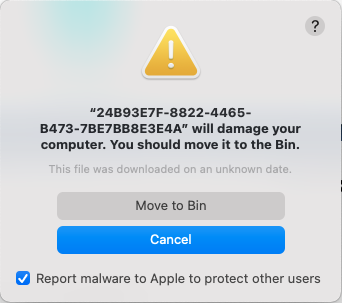I have been having multiple pop-ups since this morning, and each popup occurs around 2-3 hours after the previous one, and has the following message:
“24B93E7F-8822-4465-B473-7BE7BB8E3E4A” will damage your computer. You should move it to the Bin.
I'm on a Mid-2012 13-inch MacBook Pro that only supports MacOS Catalina but I’ve got a patched version of MacOS Big Sur (Patched Sur by BenSova) running. I have not downloaded anything in the last week, but the popup has started appearing since today only. I have no idea what this file is or where it is located.
Can anyone suggest any methods (without downloading an anti-virus, if possible) by which I can remove this file permanently?


Move to Bin?